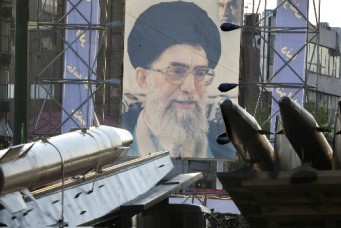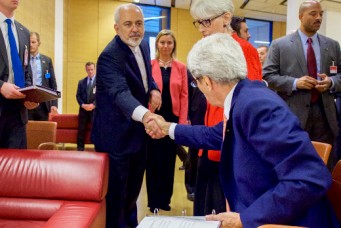Postcard From Iran
Iranians are hopeful for a finalized agreement between Iran and the United States that will renew relations between the two countries.
Traveling to Iran in May 2014 and again last month, I felt the sense of anticipation over the nuclear negotiations, which people hope will conclude by July and will lead to a significant easing of economic sanctions and political isolation. Iranians are excited to meet tourists from the United States, seeing these visitors as an indication that some Americans are ready to discover Iran on its own terms.
Iranians laugh at the image of America as the “Great Satan” and at the faded Down-With-the-US murals still visible on a few buildings. Memories of the Shah have receded over thirty-five years. It is fascinating to see Iranians visit sites such as the Niavaran palace, where they can admire Empress Farah Diba Pahlavi’s evening gowns and check out the stuffed animals in her children’s bedrooms.
Instead, it is the eight year war launched by Saddam Hussein in 1980 that is deeply imprinted in the collective memory. The faces of young men who died in that grueling conflict stare from street-side placards. People recall the terror of the aerial bombardments that rained down on them without there being any shelter. The exhibit that we saw at Tehran’s Aaran Art Gallery displayed Nasser Bakhshi’s haunting images of loss, coupled with affirmations of the bonds that soldiers forge as they fight side by side in the trenches. Iranians can’t forget that Washington provided crucial military assistance to Iraq throughout those terrible years, even though Iraq initiated the conflagration.
Fear of returning to such deep insecurity is one reason for people to support the negotiations and seek a reset in foreign relations, after years of Washington threatening military action, directly or via Israel. That fear also propels Iranians to seek strong air and naval defense systems, which the country lacked in the 1980s. But fear is not the main motivation. Many hope for an end to stifling restrictions and the return of freedom to trade and travel. They want to be able to use credit cards and transfer funds, and they wonder when they will catch a direct flight to JFK or LAX.
For the governments involved in the negotiations, there’s too much baggage from past and present conflicts for them to view reconciliation as a simple process. Washington remains angry at the 1979 hostage crisis and Iran’s support for attacks on the American embassy and Marine barracks in Beirut in 1983; is antagonized by Iranian support for Bashar Al-Assad’s regime, Hizbollah and Hamas, and wary of its involvement with the Houthi movement in Yemen; resents Iran’s arming Iraqi militias that attacked American troops during the U.S. occupation; and decries the detention of American citizens—most recently the Washington Post’s Jason Rezaian. Iran resents Washington’s past efforts to foment regime change, threats to launch military strikes, and (tacit) support for Israel’s assassination of Iranian nuclear physicists, sabotage of missile-testing and enrichment sites, and cyber-attacks on nuclear facilities. These deepen the sense of being surrounded by enemies, a perception exacerbated by the U.S. invasions of neighboring Afghanistan and Iraq. These fears cannot be ignored, and must be taken into account when listening to the rhetoric about Iranian expansionism.
We reached Tehran a few days after the framework for a nuclear agreement was signed in Vienna and wished we had been there to see crowds greet Foreign Minister Mohammad Javad Zarif. Those with whom we spoke stressed that some “95 percent of Tehran residents” backed the agreement, even with the tough conditions that limit Iran’s uranium enrichment to Natanz and to a 3.67 percent level, block uranium enrichment at Fordow and plutonium enrichment at Arak, and tighten International Atomic Energy Agency surveillance of uranium mines and mills, as well as centrifuge-production, energy-generation, and research. As people tend to agree with the government’s stated opposition to nuclear weapons, their concern is to ensure the country’s right to medical research and ample electricity.
There’s strong support for the government’s efforts to undo the ill-conceived policies (and huge corruption) of the Mahmoud Ahmadinejad era (2005-2013), and to create a knowledge-based economy that will focus on the export of value-added products rather than raw materials. International companies seek contracts to help develop the vast South Pars natural gas field, whose reserves will last for seventy years even without new discoveries. Executives from BP, Total, Eni, Lukoil and other companies meet (informally) with oil ministry officials. Other companies seek to invest in the power-generating plants, wind-turbines, and transmission lines that Iran plans to expand for domestic needs and for export to its neighbors. Meanwhile, the government offers tax incentives in order to attract foreign investment in manufacturing, not only trade. And Europeans seek to reopen joint production operations—such as Peugeot-Citroen’s vehicle assembly plant—that were forced to close in 2012. As Iranian businessmen open high-end hotels and the government spruces up long-neglected hostelries, there’s hope for an infusion of cash from abroad into the tourism sector. Isfahan, for example—the most prized destination aside from Persepolis—struggles to accommodate foreign visitors as it only has two five-star hotels.
There are many worries too. Iran needs to confront its high levels of pollution in the cities and its dire water crisis. As 97 percent of its surface water is exploited, rivers and lakes are drying up and cities face alarming shortages. Technical fixes won’t be enough, however. To bolster a knowledge-based economy integrated into the global economy, Iran needs a strong private sector, enhanced IT, and intellectual freedom. At present, the companies affiliated with the Islamic Revolutionary Guards Corps (IRGC) dominate not only military industries but also construction, oil and gas production, public transportation, and telecom—not to speak of IRGC control over internal and cross-border security. That poses severe constraints on the possibilities of reforming economic and financial systems and of reining in corruption.
Moreover, promoting IT and intellectual freedom run counter to state guardianship over morals and behavior. President Hassan Rouhani says that the government should not interfere in peoples’ lives, affirms women’s equality, and criticizes the security police for arresting improperly-clad women. But he does not control the police and cannot prevent the IRGC from arresting people. Police even raid concerts that are licensed by the Ministry of Culture. Each city’s IRGC-linked security force calls the shots: for example, live music is allowed in restaurants in Tehran and Shiraz, but not in Isfahan. Whereas Rouhani’s minister of communications and information speeds up the Internet to facilitate global access, Internet police arrest people based on their social media posts and the judiciary orders the government to shut down WhatsApp, Viber, and Tango because of their allegedly immoral content.
There’s hope that a successful conclusion of the nuclear negotiations will reinforce Rouhani’s authority, enabling his government to push back on these issues. But that hope is tempered by the reality that it is Supreme Leader Ayatollah Ali Khamenei who controls the state TV and radio stations, the judiciary, and the Friday prayer leaders—and the IRGC cadres who control the streets. Perhaps the parliamentary elections, scheduled for February 2016, will strengthen the reformist political trend. Given the government structure, change will be limited and piecemeal. Nonetheless, a successful conclusion to the nuclear negotiations will open up new possibilities in both domestic policies and foreign relations. Failure—especially if failure occurs in the current context of heightened regional tensions—will entrench the IRGC and regime-hardliners, risk the return to political and economic isolation, and renew fears for the future, fears that remain close to the surface.
Ann M. Lesch, former Dean of Humanities and Social Sciences and former Associate Provost for International Programs at the American University in Cairo, escorted tours to Iran in May 2014 and April 2015. This essay reflects her personal views.



